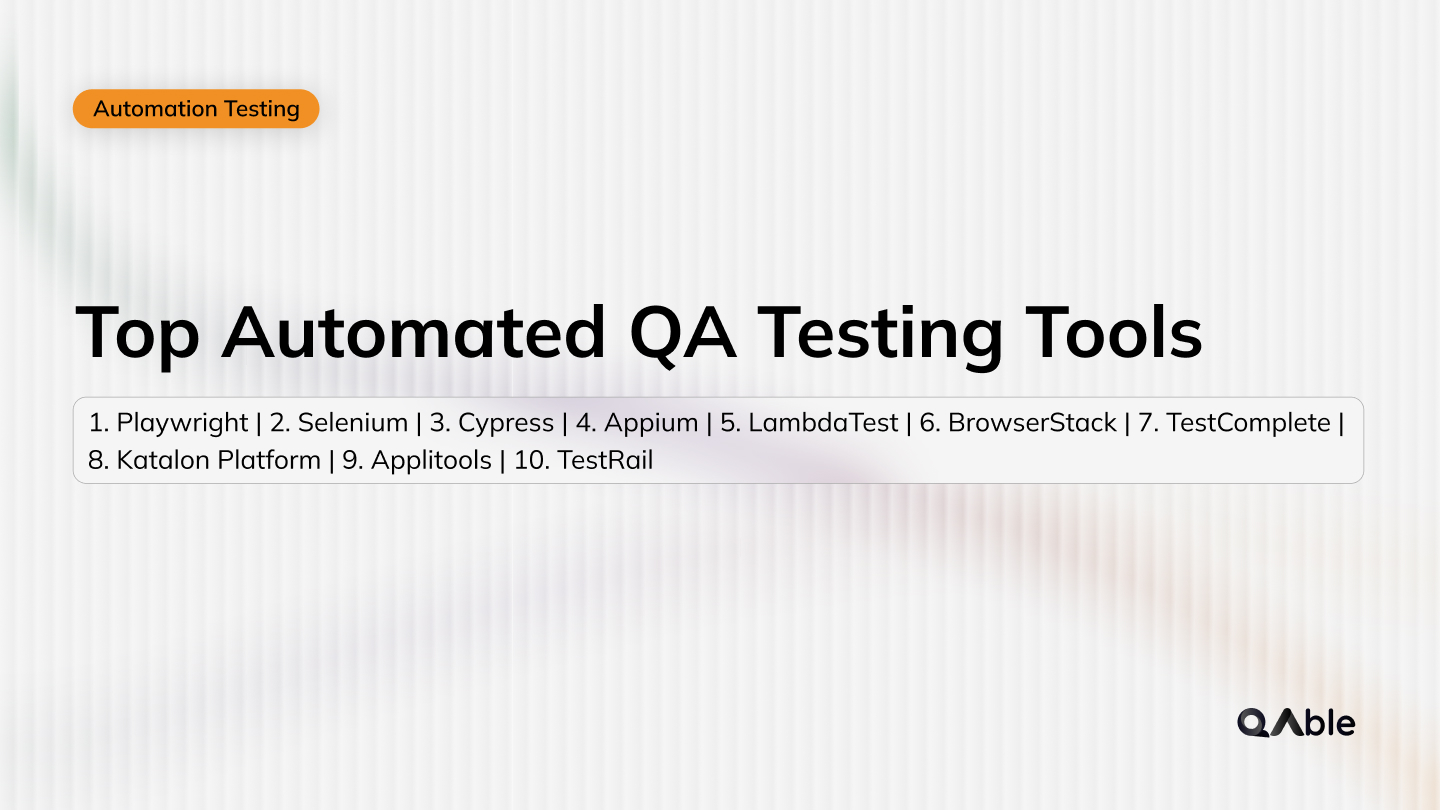Table of content
SHARE THIS ARTICLE
Is this blog hitting the mark?
Contact Us
Table of Content
- Why is QA So Important for Fintech Applications
- Fintech Software Testing Challenges
- QA Best Practices in Fintech
- Comprehensive Testing Across Multiple Scenarios
- How to Choose a QA Partner for Fintech Software
- Case Studies on Successful Fintech QA Implementation
- FAQs
In the highly competitive world of fintech where accuracy, security, and performance are critical success factors, Quality Assurance or QA is one of the most essential aspects of development that ensures that the financial applications produced meet certain set standards. Amidst the ever-evolving fintech space, it becomes imperative that organisations consider QA as a critical aspect in enhancing delivery and experiences.
This detailed article covers the importance of QA in FinTech, what it means to test fintech applications and products, how to excel at QA in fintech, the importance of security testing in fintech, and how to select the proper partner for your fintech application. Also, we will explore real-world use cases of the successful implementation of the QA function in fintech.
Why is QA So Important for Fintech Applications
Ensuring Compliance and Security
QA is also more than just finding and eliminating glitches in fintech products. In the financial industry, applications need to adhere to a large number of policies and regulations including GDPR, PCI DSS, and financial laws of the country or on the international level. These regulations are meant to safeguard consumers and guarantee the credibility of other financial dealings.
QA in fintech is carried out to check that this regulatory compliance is met to prevent merchants and users from facing the full weight of the law. Also, financial software testing plays an essential role in preventing security flaws that allow stealing data or committing financial fraud, which is especially catastrophic for the fintech industry.
Enhancing User Experience
It became clear that to succeed in a highly competitive environment, fintech companies have to provide perfect UX. When it comes to financial applications, customers require them to be attractive and appealing aside from being efficient, easy to use, accurate, and swift. This is where the work of QA becomes incredibly important in testing the application’s user interface and user experience.
QA in FinTech constantly checks that the transactions are completed correctly, the graphical user interface is intuitive, and the application runs effectively under different scenarios. A strong emphasis on user engagement is vital for growth and maintaining a competitive advantage over other applications.
Building Trust and Credibility
The importance of trust cannot be overemphasised, especially in any form of financial service that FinTech seeks to provide. Customers' confidence in their transactions requires them to be safe and free from errors.
Quality assurance for financial services makes sure that the fintech applications are accurate and free from fatal flaws that might dent the consumers’ trust. During functional testing, QA teams contribute to establishing the reliability of fintech brands and making users believe that they can confidently share their financial information and transactions with the application.
Also read: Software Quality Assurance in Financial Services: A Comprehensive Guide
Fintech Software Testing Challenges
Complex Regulatory Environment
Another important consideration is the regulatory environment, which remains one of the most pressing issues in the context of fintech software testing. The use of classical fintech applications implies compliance with various financial regulations, as well as the fact that the range of regulations can be conditionally divided into regional or country standards.
This means that QA teams should be up-to-date with the current industry requirements and do rigorous compliance testing. This task becomes even more challenging when the fintech company is based in one country while its operations are spread across several countries with varying legal systems.
Security Concerns
Security is a paramount concern in the fintech industry. As cyber threats become increasingly sophisticated, financial software testing must evolve to address these risks. QA teams must perform extensive security testing, including penetration testing, vulnerability assessments, and secure coding reviews. The goal is to identify and fix any vulnerabilities that could be exploited by cybercriminals. Given the sensitive nature of financial data, even a minor security flaw can have catastrophic consequences, making security testing an integral part of the QA process.
Integration with Legacy Systems
Many fintech applications need to integrate with existing banking systems, which are often outdated and complex. This integration poses a significant challenge for QA teams, who must ensure that the new software works seamlessly with legacy systems without compromising performance or security. Testing these integrations requires specialised knowledge and thorough validation to prevent any disruptions to service.
Rapid Development Cycles
The fintech industry is known for its fast-paced innovation, with companies often racing to bring new products to market. This urgency can put immense pressure on QA teams to validate software quickly without compromising quality.
To meet these demands, many fintech companies adopt continuous integration and continuous testing practices, which allow for faster, more efficient QA processes. However, maintaining thoroughness in testing while adhering to tight timelines remains a significant challenge.
QA Best Practices in Fintech
Early Involvement in the Development Cycle
In the fintech industry, involving QA from the earliest stages of development is crucial. Early involvement allows QA teams to identify potential issues at the design stage, where they are easier and less costly to address. This proactive approach helps to minimize the risk of defects and ensures that the software is built with quality in mind from the outset.
Implementing Automation
Given the complexity and repetitive nature of fintech software testing, automation is a best practice that can significantly enhance efficiency and accuracy. Automated testing allows QA teams to execute test cases more quickly and consistently, freeing up human testers to focus on more complex and exploratory testing tasks. Software testing for fintech that includes automation is particularly valuable in regression testing, where previously validated functionalities need to be rechecked after updates or changes to the software.
Focus on Security Testing
Security testing should be a top priority in any fintech QA strategy. Given the high stakes involved, financial software testing must include robust security measures to protect against cyber threats. Incorporating techniques such as ethical hacking, threat modeling, and secure code reviews into the QA process can help identify and mitigate potential vulnerabilities before the software is deployed.
Also read: Fintech App Testing Strategy :What and How?
Comprehensive Testing Across Multiple Scenarios
Fintech applications must perform flawlessly under a wide range of scenarios, including high transaction volumes, various user inputs, and integration with external systems. QA teams should design test cases that cover all possible scenarios to ensure the application’s robustness. This comprehensive approach helps to prevent failures in live environments, where the consequences could be severe.
Security Testing in Fintech Applications
The Imperative of Data Protection
In the fintech industry, protecting user data is not just a legal requirement but also a business imperative. QA in fintech must include extensive data protection measures to ensure that sensitive financial information is kept secure.
This involves not only encryption and secure data storage but also thorough testing of all data handling processes to identify any potential weaknesses.
Regulatory Compliance and Audits
As fintech companies handle large amounts of sensitive financial data, they are subject to regular audits to ensure compliance with industry regulations. Financial software testing must include thorough documentation and reporting to facilitate these audits and demonstrate compliance.
QA teams should be prepared to provide detailed evidence of the testing processes and results to satisfy regulatory requirements.
How to Choose a QA Partner for Fintech Software
Expertise in Financial Services
When selecting a QA partner, it's essential to choose a company with proven experience in financial services. A partner with deep knowledge of fintech software testing will understand the unique challenges of the industry, including regulatory compliance, security, and integration with legacy systems. This expertise is critical to ensuring that the QA process is both thorough and efficient.
Strong Focus on Security and Compliance
Given the importance of security in FinTech, your QA partner should prioritize security testing and have a strong understanding of compliance requirements. A QA partner with expertise in secure software development practices and regulatory testing can help ensure that your application is both secure and compliant with all relevant regulations.
Capability in Automation and Continuous Testing
The ability to implement automation and continuous testing is essential for fintech applications that require rapid iteration and deployment. Look for a QA partner who can deliver on these fronts, using the latest tools and techniques to streamline the testing process without compromising quality.
Proven Track Record with Fintech Clients
When choosing a QA partner, it's important to consider their track record with other fintech clients. Look for case studies, testimonials, and references that demonstrate their ability to deliver high-quality QA services in the fintech sector. A proven track record is a strong indicator that the QA partner can meet the specific needs of your fintech application.
Case Studies on Successful Fintech QA Implementation
Case Study 1: Enhancing Security for a Mobile Banking App
A leading fintech company partnered with a QA firm to conduct thorough security testing on their mobile banking app. The QA team identified and resolved critical vulnerabilities, ensuring the app’s compliance with industry regulations. This not only prevented potential breaches but also boosted user trust in the app.
Case Study 2: Streamlining Integration with Legacy Systems
Another fintech company faced challenges integrating its new payment platform with existing banking systems. The QA partner conducted extensive integration testing, ensuring seamless communication between the new and old systems. This led to a successful launch without any disruptions to the service.
Case Study 3: Accelerating Time-to-Market with Automation
A fintech startup needed to quickly bring its new trading platform to market. By implementing automated testing, the QA team was able to expedite the testing process, reducing the overall development time while ensuring high-quality software. The platform launched on schedule and received positive feedback for its reliability and performance.
Conclusion
Quality Assurance is not just an optional step in fintech development—it is an essential component that ensures the success and sustainability of financial applications. QA in fintech involves navigating complex regulatory environments, addressing security concerns, and ensuring a flawless user experience.
QAble, a reputed financial application testing company, specializes in delivering secure, compliant, and high-performance solutions for fintech companies. With a strong focus on automation and industry-specific expertise, QAble ensures that your fintech applications meet the highest standards of quality and security.
By following best practices and choosing the right QA partner, fintech companies can deliver reliable, secure, and user-friendly applications that meet the highest standards. Investing in comprehensive QA processes is not just about preventing issues; it's about building trust, ensuring compliance, and ultimately, achieving success in the competitive fintech landscape.
Discover More About QA Services
sales@qable.ioDelve deeper into the world of quality assurance (QA) services tailored to your industry needs. Have questions? We're here to listen and provide expert insights


Nishil Patel is the Co-founder of QAble, delivering advanced test automation solutions with a focus on quality and speed. He specializes in modern frameworks like Playwright, Selenium, and Appium, helping teams accelerate testing and ensure flawless application performance.
.svg)














.webp)
.webp)
.png)
.png)











.png)



.png)

.png)

.png)






.jpg)






.jpg)
.jpg)
.jpg)




.webp)

